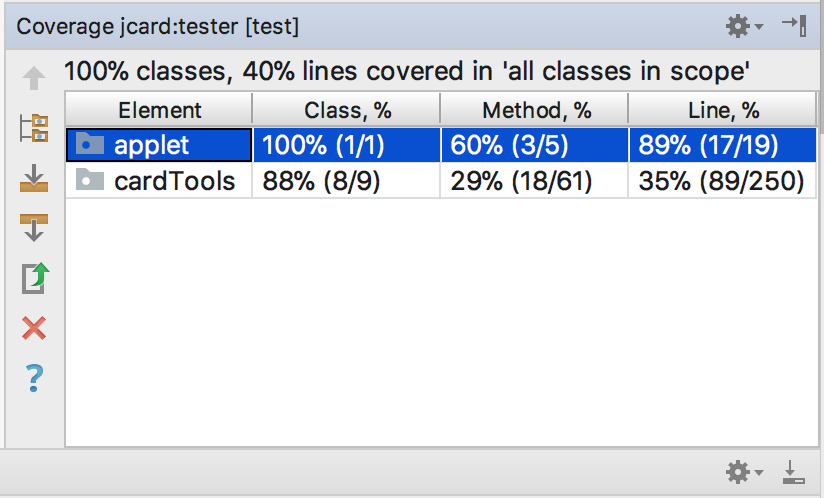This is simple JavaCard project template using Gradle build system.
You can develop your JavaCard applets and build cap files with the Gradle! Moreover the project template enables you to test the applet with JCardSim or on the physical cards.
Gradle project contains one module:
applet: contains the javacard applet. Can be used both for testing and building CAP
Features:
- Gradle build (CLI / IntelliJ Idea)
- Build CAP for applets
- Test applet code in JCardSim / physical cards
- IntelliJ Idea: Coverage
- Travis support
The template contains simple Hello World applet generating random bytes on any APDU message received. There is also implemented very simple test that sends static APDU command to this applet - in JCardSim.
The Gradle project can be opened and run in the IntelliJ Idea.
Running in IntelliJ Idea gives you a nice benefit: Coverage!
- Clone this template repository:
git clone --recursive https://github.com/ph4r05/javacard-gradle-template.git-
Implement your applet in the
appletmodule. -
Run Gradle wrapper
./gradlewon Unix-like system or./gradlew.baton Windows to build the project for the first time (Gradle will be downloaded if not installed).
-
Setup your Applet ID (
AID) in the./applet/build.gradle. -
Run the
buildJavaCardtask:
./gradlew buildJavaCard --info --rerun-tasksGenerates a new cap file ./applet/out/cap/applet.cap
Note: --rerun-tasks is to force re-run the task even though the cached input/output seems to be up to date.
Typical output:
[ant:cap] [ INFO: ] Converter [v3.0.5]
[ant:cap] [ INFO: ] Copyright (c) 1998, 2015, Oracle and/or its affiliates. All rights reserved.
[ant:cap]
[ant:cap]
[ant:cap] [ INFO: ] conversion completed with 0 errors and 0 warnings.
[ant:verify] XII 10, 2017 10:45:05 ODP.
[ant:verify] INFO: Verifier [v3.0.5]
[ant:verify] XII 10, 2017 10:45:05 ODP.
[ant:verify] INFO: Copyright (c) 1998, 2015, Oracle and/or its affiliates. All rights reserved.
[ant:verify]
[ant:verify]
[ant:verify] XII 10, 2017 10:45:05 ODP.
[ant:verify] INFO: Verifying CAP file /Users/dusanklinec/workspace/jcard/applet/out/cap/applet.cap
[ant:verify] javacard/framework/Applet
[ant:verify] XII 10, 2017 10:45:05 ODP.
[ant:verify] INFO: Verification completed with 0 warnings and 0 errors.
./gradlew installJavaCardOr inspect already installed applets:
./gradlew listJavaCardAs simple as:
./gradlew runBy default the run task will run the main Java application implemented at: main/java/main/Run.java, using the HelloWorldApplet applet.
./gradlew test --info --rerun-tasks
Output:
Running test: Test method hello(AppletTest)
Gradle suite > Gradle test > AppletTest.hello STANDARD_OUT
Connecting to card... Done.
--> [00C00000080000000000000000] 13
<-- 51373E8B6FDEC284DB569204CA13D2CAA23BD1D85DCAB02A0E3D50461E73F1BB 9000 (32)
ResponseAPDU: 34 bytes, SW=9000
This project uses mainly:
- https://github.com/bertrandmartel/javacard-gradle-plugin
- https://github.com/martinpaljak/ant-javacard
- https://github.com/martinpaljak/oracle_javacard_sdks
- https://github.com/licel/jcardsim
- Petr Svenda scripts
Kudos for a great work!
Thanks to Martin Paljak's ant-javacard and oracle_javacard_sdks we support:
- JavaCard 2.1.2
- JavaCard 2.2.1
- JavaCard 2.2.2
- JavaCard 3.0.3
- JavaCard 3.0.4
- JavaCard 3.0.5u1
- JavaCard 3.1.0b43
Java 8-u271 is the minimal version supported.
Make sure you have up to date java version (-u version) as older java 8 versions
have problems with recognizing some certificates as valid.
Only some Java versions are supported by the JavaCard SDKs. Check the following compatibility table for more info: https://github.com/martinpaljak/ant-javacard/wiki/Version-compatibility
This is a nice benefit of the IntelliJ Idea - gives you coverage results out of the box.
You can see the test coverage on your applet code.
- Go to Gradle plugin in IntelliJ Idea
- Tasks -> verification -> test
- Right click - run with coverage.
If you experience the following error:
java.lang.VerifyError: Expecting a stackmap frame at branch target 19
Exception Details:
Location:
javacard/framework/APDU.<init>(Z)V @11: ifeq
Reason:
Expected stackmap frame at this location.
Then try running JVM with -noverify option.
In the IntelliJ Idea this can be configured in the top tool bar with run configurations combo box -> click -> Edit Configurations -> VM Options.
However, the com.klinec:jcardsim:3.0.5.11 should not need the -noverify.
You may experience error like this: Invalid APDU loaded. You may have JC API in your classpath before JCardSim. Classpath:
This error is thrown by JCardSim which tries to load APDU class augmented with another methods. The augmented APDU version is contained in the JCardSim JAR.
However, if api_class.jar from the JavaCard SDK is on the classpath before the JCardSim, this problem occurs. The classpath ordering causes non-augmented version is loaded which prevents JCardSim from correct function.
gradle-javacard-plugin v1.7.4 should fix this error.
If you still experience this in IntelliJ Idea try: open project structure settings -> modules -> applet_test and move JCardSim to the top so it appears first on the classpath. This has to be done with each project reload from the Gradle.
TODOs for this project:
- Polish Gradle build scripts
- Add basic libraries as maven dependency.
Community feedback is highly appreciated - pull requests are welcome!

